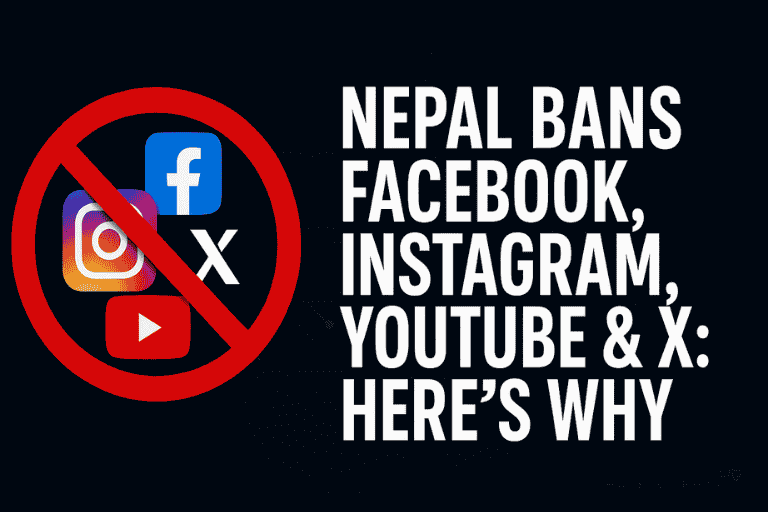The government of Nepal has asked their internet service providers to censor large social media sites, such as Facebook, Instagram, YouTube, X (previously Twitter), LinkedIn, Reddit, and more a nationwide digital crackdown of almost all everyday communication by millions of people.
The reason? By the deadline set out by the government, these platforms had not registered with the Ministry of Communication and Information Technology.
What Prompted the Shutdown
The government of Nepal mandated all social media companies (local or foreign) under the “Directive on Regulating the Use of Social Networks, 2023” to seek registration, have a local liaison, and a system of grievance redressal.
Platforms that failed to comply received a seven-day notice between August 28 and register. When the cut-off elapsed with platforms such as Meta (Facebook, Instagram, WhatsApp), Alphabet (YouTube) and X inapplicable, the government acted with speed to enforce the prohibitions.
The Position in the Supreme Court and the Regulatory Objectives
Government oversight and accountability was once more reinforced when the Supreme Court previously ordered that no social media platform could be allowed to run in Nepal without proper registration.
The prohibition is a component of a long-term effort to make platforms responsible to content, misinformation and hate speech moderation.
Social Networks Which Remained Open
Some of them already created services before the deadline and are still active, such as Tik Tok, Viber, Nimbuzz, WeTalk, and Popo Live. Telegram and Global Diary is in registration process and is fully operating.
Short-term effect: Shock and Social Revolt
In Nepal, social media accounts for almost 80 percent of internet traffic, and billions of Nepal-Nepal interactions are made each day through Facebook, WhatsCall, and YouTube. The blackout has cut off personal communications, small enterprises, online news availability, and government outreach.
Telecom providers, such as Ncell, have risked losing much revenue by projecting that online commerce and advertisement would be highly impacted.
The ban has been accompanied by strong criticism, by civil rights organizations, the press, political parties, and even the National Human Rights Commission, which publicly expressed its demonstrations against this step, demanding much more moderate actions.
Critics call such activities detrimental to freedom of expression and may involve digital authoritarianism.
Digital Sovereignty or Digital Control?
The government justifies its action as a need to enforce digital sovereignty ensuring that online platforms that serve its jurisdiction comply with its legal systems as claimed by government officials, local registration is the answer to cyber threats, fake news, and civil peace.
What Is to Come: Potential Reopenings or Stalemate?
Approved sites can be reinstated manually on the day indicating that the restriction is contingent and can in fact be reversed with ease once complied with. This may lead to a disproportionate re-entry of digital, as one platform may reintegrate earlier than another.
A Crisis of Change in Nepal Digital
Nepal is currently at the crossroads between regulatory control and national security, on the one hand, and digital freedom and access to global platforms, on the other hand.
The moves by the government can serve as an example to other countries seeing what Nepal has done in digital governance.
Considering this centrality of social media in the day-to-day lives of people any regulatory move taken should be fine-tuned not to suffocate any civil liberties but provide the online space with accountability and transparency.


